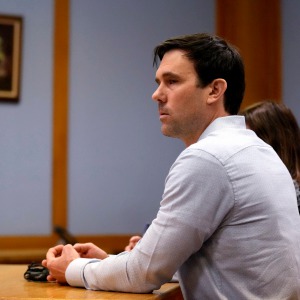Forum for March 22, 2024: VT-ALERT
| Published: 03-22-2024 2:19 PM |
I encourage everyone living in Vermont, or who spends time there, who is not already signed up to VT-ALERT to do so.
Vermont Emergency Management launched VT-ALERT in 2013 as a means of reaching Vermonters directly with emergency information via their cell phones, email or home phones. The system allows users to choose which alerts they receive, how they receive them, and for which specific geographic area.
To sign up go to: https://vem.vermont.gov/vtalert.
State and local responders use VT-ALERT to notify the public of emergency situations. Those include, but are not limited to, evacuation information; chemical spills; shelter-in-place alerts; severe weather advisories; boil water advisories, and roadway interruptions.
Users can list up to five additional locations in Vermont for which they want to receive alerts. These locations may include, for example, towns where other family members live, or where children attend school.
You can also choose not to be notified during certain times, such as when you are sleeping.
I signed my household up soon after VT-ALERT went live, specifying Bradford and the surrounding towns and have found the notifications very valuable. We get the alerts on our home phone, cell phones and via email.
For example, when Route 5 between Bradford and Fairlee was closed last month for a few hours because of an accident, we knew to take I-91. We also were notified of the I-91 rock slide and received many updates as the situation unfolded.
Article continues after...
Yesterday's Most Read Articles
 Herd departs Hartford’s last remaining dairy farm
Herd departs Hartford’s last remaining dairy farm
 Kenyon: What makes Dartmouth different?
Kenyon: What makes Dartmouth different?
 At Dartmouth, hundreds protest ongoing war in Gaza and express support for academic freedom
At Dartmouth, hundreds protest ongoing war in Gaza and express support for academic freedom
 Editorial: Parker parole a reminder of how violence reshapes our lives
Editorial: Parker parole a reminder of how violence reshapes our lives
 A Life: Richard Fabrizio ‘was not getting rich but was doing something that made him happy’
A Life: Richard Fabrizio ‘was not getting rich but was doing something that made him happy’
Gary W Moore
Bradford, Vt.,
emergency management director
GOP should end
its climate denial
Most Americans understand that the world is facing a climate crisis that’s been caused by human action and that we dare not respond with inaction. Yet most of the Republican presidential candidates sidestepped the issue. Vivek Ramaswamy went even farther in echoing Donald Trump’s line that climate change is a hoax.
While the GOP presidential candidates mirroring their congressional counterparts in being so out of touch on this vital issue may help the Democrats at the ballot box in 2024, the world can’t take any more denial and inaction. It’s time to confront Republican leaders about it. One place to start is by telling Republican members of Congress that recent statistics from Data for Progress show that voters overwhelmingly reject the climate principles in their agenda for 2025, which favors business as usual — including drilling for and mining of fossil fuels — over science-based policies to reduce carbon emissions. Then ask them what they would do right now to counteract the unprecedented climate catastrophes of the past year, which science warns us are merely a preview of what’s ahead. They need to know that Americans won’t accept more climate change denial and inaction from them.
Steve Gehlert
West Newbury
Improve the debates,
or end them
Now that the general election campaign for president has begun, we will soon hear calls for debates between the two major party candidates. I wish we would declare a moratorium on those events.
In college, I was on the debate team for two years. It was very enjoyable and I learned some important skills — critical thinking, gathering evidence to support a particular position, and expressing oneself clearly and concisely. The typical presidential debates seldom showcase those skills. They strike me as more akin to professional wrestling or adolescent put-down contests. I am not interested in the best zingers or snappiest witticisms or most unfortunate gaffes. Those may make for good television, but they have very little, if anything, to do with governing. I want to know about a candidate’s overall hopes and specific plans. I want evidence that a candidate has carefully thought about those hopes and plans.
However, if we must have these things, here is the format I propose:
1. No audience is present in the television studio.
2. There is one moderator, facing the two candidates while being seated in a comfortable chair.
3. The candidates are seated in similar chairs facing each other.
4. There would be continuous fact checking. This could be done in a variety of ways, but the candidates and the television audience would know that misinformation and/or outright lies would be exposed.
5. There would be some agreed upon rules about how the candidates could interact with each other by asking questions or reacting to statements, but there would be no personal attacks or name-calling or interruptions. And, if a candidate engages in any of those, the microphone gets turned off.
I won’t hold my breath about this format being adopted, but, if it were, it would be a huge improvement over the pseudo-“debates” that have occurred in the past.
Here’s another option: What if the candidates who are running for president have an actual quartermile foot race? That might make for good television, but it wouldn’t tell us who has the wisdom and integrity to be a good president. Sad to say, neither do the so-called debates.
John Morris
East Corinth
Netanyahu is the issue
O. Sami Saydjari’s commentary (“There must be room for debate on Palestine,” March 12) was an affirmation of what I have been feeling these past months.
I fell in love with Israel when I lived there in the late 1970s and early 1980s. At that time the Labor Party had a significant voice in politics and government. Slogans such as “Land for Peace” and “Peace Now” resonated throughout the country and its government.
The Israeli government now under Netanyahu is an extremist right-wing, racist state. Yes, Israel, as any other country has the right to defend itself and assure its security. But the retribution he has rained down on Gaza is not such a defense, and continuing the annihilation of Palestinians in Gaza will only weaken Israel’s security. To suggest that condemnation of Netanyahu’s government is antisemitic conflates politics with racism. As Saydjari points out, there are many, many Jews who are horrified by the Netanyahu government; I am one of them.
Antisemitism is real and it is on the rise. I am a first generation American, the daughter of a Holocaust survivor, and I am acutely aware of this. To suggest that support of Netanyahu has to be unconditional and that any criticism of his government’s policies is tantamount to antisemitism will only breed more antisemites. We don’t need more.
In the spirit of Ramadan, it is time for a permanent ceasefire and a return of the hostages. It is past time to hold Israel to the same standards to which we hold other countries who receive US aid, and we should flood our lawmakers with calls or emails urging them to do so.
Deborah Springhorn
West Lebanon
Counteracting
gun culture
Guns have become part of our cultural identity. I find it distressing being in a country where 393 million firearms are privately owned; where 500 companies make AR-15 variants, along with hundreds of tactical-gear makers; where virtually anyone can buy a kit online to build a gun from parts — without a background check; where maximizing profits rather than protecting the public is key to the gun economy.
What I find even more troubling is how little we know about the effectiveness of regulating firearms. Limited or inconclusive evidence as to effectiveness exists for common ideas like background checks, bans of handguns and the sale of assault weapons and high capacity magazines, safety training requirements, gun registration, gun licensing, and waiting periods. The Rand Report (Jan. 10, 2023) found strong evidence for only three policies: two of these, stand-your-ground laws and concealed-carry laws, appear to increase the number of firearm homicides; child-access prevention laws, on the other hand, reduce firearm suicide, unintentional self-injuries and deaths, and homicides among young people.
Time is not on our side in view of the prevalence of gun violence in the U.S. especially in cities. Though we might not have empirical evidence of a strategy’s effectiveness, we do have access to ideas derived from our collective experiences. Witness the following: background checks to purchase ammunition; red flag laws are promising, particularly for reducing gun suicides; gun taxes — an additional 20% sales tax, on each handgun and AR-15-style weapon would significantly reduce demand; use of pepper spray to deter an invader; call for “corporate responsibility”; microstamp guns; develop “smart guns;” apply state sales tax on the number of guns sold; institute a national permit-to-purchase (PTP) policy requiring people to obtain a permit before buying a firearm; mandatory gun-liability insurance; restrictions on the marketing of guns.
The White House Office of Gun Violence Prevention (established in September 2023) will help to insure the availability of data and funding to inform policies designed to reduce gun violence.
Bob Scobie
West Lebanon

 Editorial: Chris Sununu’s moral vacuum
Editorial: Chris Sununu’s moral vacuum Editorial: Gambling tarnishes America’s sporting life
Editorial: Gambling tarnishes America’s sporting life By the Way: A white nationalist’s many mistruths
By the Way: A white nationalist’s many mistruths
